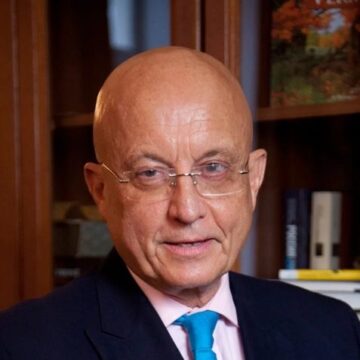This is the article ordered by Financial Times to Professor Sergei Karaganov. But is was not published for the lack of space. But we still believe it is worth reading.
Russian troops near the border of Ukraine are not going to move into the country. It is simply senseless. Grabbing land devastated by its anti-national and corrupt ruling strata is one of the worst scenarios. Troops are there to prevent another assault on Donbass republics. If that happens, Kyiv’s army will be destroyed and what is left of the already failed state will probably collapse. These troops and other military–technical means, as Russia generals nicely put it, are there to increase pressure on puppeteers rather than on puppets.
Russia could count on its greatly enhanced military capability giving it probably what Western experts call “escalation dominance” in Europe and in other areas of vital interest. We also know that Article 5 of the North Atlantic Treaty Organization is absolutely hollow – read it – in spite of avalanche of assurances. And U.S. under no circumstances would fight in Europe against a nuclear country risking devastating response. I studied the history of the development of U.S. nuclear strategy. In addition, Russia stands back to back with China, which greatly enhances military-political capabilities of both.
US and NATO are still rejecting fair Russian proposals – stopping further NATO expansion, which is seen as absolutely unpalatable and pregnant with a big war, deployment of offensive arms in East-Central Europe, return to the status quo ante of 1997 when the Russia-NATO Act was signed. The U. S. counter proposals about talks on confidence-building measures and arms control sound pleasant, but they are largely senseless. We had them before.


We are also complicit for creation of the current prewar situation – by being weak and trusting our Western partners. Not anymore.
We also know if NATO used to be a defensive alliance, it has degenerated into an aggressive one after bombing what was left of Yugoslavia, aggression of most alliance members against Iraq, aggression against Libya, leaving behind hundreds of thousands dead and devastated areas.
NATO is not an immediate threat. We observed its fighting capabilities in Afghanistan. But we see it as a dangerous virus spreading bellicosity and thriving on it. Also it is obvious that the closer it comes to our borders the more dangerous it could become. Russia crushed all European coalitions trying to defeat Russia – the last led by Napoleon and Hitler. But we do not want another war. Even if not on our territory.
The security system in Europe, built largely by the West since 1990-s, when a peace treaty was not signed after the end of the previous Cold War, is dangerously unsustainable.
There are a few ways to solve the narrow Ukrainian problem. Return of countries like her to permanent neutrality, legal guarantees by several key NATO countries not to vote ever for further expansion of the block. Diplomats, I assume, have a few others. We do not want to humiliate Brussels by insisting on repudiating it’s erroneous plea for open-ended expansion of NATO. We all know the end of the Versailles humiliation. And, of course, implementation of the Minsk agreements.
But the task is wider: to build a viable system on the ruins of the present. And without resorting to arms, of course. Probably in the wider Greater Eurasian framework. Russia needs a safe and friendly Western flank in the future world competition. Europe without Russia or even against it has been rapidly loosing its international positions. That was predicted by many people in the 1990s, when the Russian offer to integrate with, not in, we are too big and proud, was rejected. But there is always a chance.










